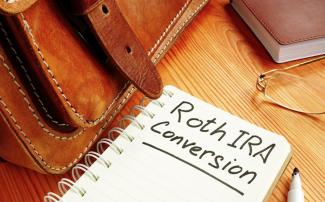
Roths on Sale
Every year around this time, financial planners talk to clients about Roth conversions. But this year, there are a few extra reasons to consider moving money from a traditional IRA into a Roth.
Roth IRAs are attractive for several reasons. With traditional IRAs (and qualified plans like 401(k)s), the money one contributes is not taxed, but you must pay ordinary income taxes whenever you take money out of the account--which might be years in the future. The Roth reverses this; your contribution is made with after-tax dollars, but then there's no tax whenever the money is distributed during retirement.
If you believe, as many financial professionals do, that tax rates are going to go up in the future, then paying taxes now and eliminating future taxes provides a net gain.
Another interesting thing about Roths is that, unlike traditional IRAs, they don't have any minimum distribution requirements once you turn age 72. So long as the money remains in the account, both Roths and traditional IRAs give you the benefits of tax deferral, which eliminates a significant drag on the growth of your money. If you can afford to keep your money in the Roth account, and take retirement income from other sources, then the deferral can go on longer.
Finally, having money in a Roth account gives you a lot more control over your tax bracket in retirement. For instance, you might take out just enough from your traditional IRA distributions to fill the 15% bracket, and then take the rest of your living expenses out of your taxable accounts and Roth. This kind of planning might help higher-income retirees reduce taxes on their Social Security income and avoid higher Medicare premiums. If a married couple can keep traditional IRA distributions low enough that their the taxable retirement income is below $44,000, then they would pay taxes on just 50% of their Social Security income; otherwise, they pay taxes (at a potentially higher tax bracket) on 85% of those benefits. The higher Medicare premiums start at $182,000 of joint tax return income.
The Roth account will still be subject to estate taxes, and your heirs (not your spouse) will have to take the money out of the account over the ten years after the inheritance. But if they inherit a Roth account, they won't have to pay taxes on the distributions they receive--a nice additional gift for your children or grandchildren.
So why is this an especially good year to consider Roth conversions? Remember that you are paying taxes today on the amount that is moved from a traditional IRA to a Roth. Now that the markets have declined by more than 20%, people can transfer more stock shares today than they could have last year for the same tax payment.
Put another way, Roth conversions are more than 20% cheaper, taxwise, today than they were at this time last year. Still another way: Roth conversions are on sale—but this may be only temporary.
Every situation is different, and so there should be an individual assessment of your situation before you pull the conversion trigger. Fortunately, the law allows for partial Roth conversions--moving some of the money over, rather than all of it—so that each conversion can be tax-managed to avoid putting you into a higher tax bracket.
Source:
https://smartasset.com/retirement/is-social-security-income-taxable

